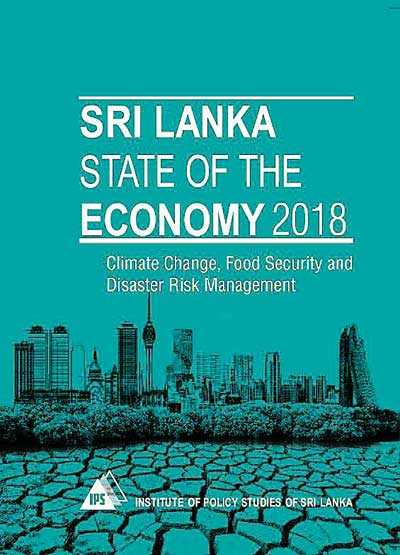Sunday Feb 22, 2026
Sunday Feb 22, 2026
Monday, 15 October 2018 00:51 - - {{hitsCtrl.values.hits}}
Higher debt servicing costs and risks that have come about with a notable shift in the composition of the creditor base makes the Sri Lankan economy more vulnerable to external shocks,  notes the annual, flagship report of the Institute of Policy Studies of Studies of Sri Lanka (IPS).
notes the annual, flagship report of the Institute of Policy Studies of Studies of Sri Lanka (IPS).
This year’s ‘Sri Lanka: State of the Economy’ report, provides a critical assessment of the country’s economic performance and near term outlook for growth and macroeconomic stability. It also examines crucial medium term policy priorities to achieve sustained growth and strengthen socio-economic development outcomes for the country. The thematic focus of the 2018 report is on ‘Climate Change, Food Security and Disaster Risk Management’ to examine the many interrelated socio-economic impacts of rising climate-induced shocks on the Sri Lankan economy.
The report is being launched on Monday, 15 October, at the Dr. Saman Kelegama Auditorium of the IPS. The keynote address at the launch will be delivered by State Minister of National Policies and Economic Affairs Dr. Harsha de Silva, while IPS Executive Director Dr. Dushni Weerakoon will present the current economic outlook for Sri Lanka. This will be followed by a panel discussion chaired by the Economic Advisor to the President, Dr. Sarath Rajapatirana. The panellists are Lion Brewery (Ceylon) PLC CEO Suresh Shah and Fitch Ratings Lanka Ltd. Country Head/CEO Maninda Wickramasinghe.
As the report highlights, the immediate worries for the Sri Lankan economy are from the external front in the form of rising oil prices as the geopolitical environment becomes less predictable, and a shift to a more decisive phase of interest rate tightening in advanced economies. The country’s excessive reliance on foreign capital to finance investment under favourable external financial conditions is now leading to disruptions as those conditions change. In these challenging times, the next steps and their outcomes for the economy are likely to be heavily determined by the intersection of politics and economics in the country.